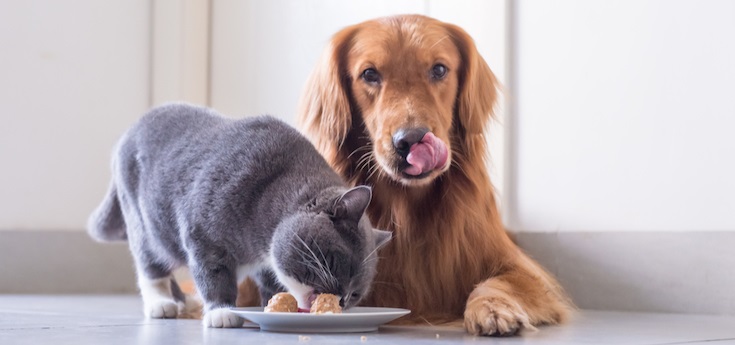You might be surprised to hear that there are no mandatory standards for pet food in Australia. I certainly was.
In other countries, such as New Zealand, the US, Japan, Singapore and throughout Europe, pet food regulation is handled by government agencies. Independent regulators ensure the products meet certain standards and that they can be recalled as soon as an issue is identified.
That’s not the case in Australia. Pet food here is essentially self-regulated, with voluntary industry standards applied through the Pet Food Industry Association of Australia (PFIAA).
There is no mandatory recall system for pet food, and no mechanism for consumers to report adverse events. Essentially, there is minimal government oversight of this industry, which makes it hard for pet owners to be confident the food they feed their pets is safe and nutritious.
The situation is currently under review but is this good enough? A pet food poisoning occurred just last year.
Read more: Vegetables dogs can and can’t eat
Outbreak of megaesophagus linked to Veganpet dry food
Megaesophagus is a disease that enlarges the oesophagus and makes eating and drinking difficult for dogs. It’s a lifelong condition and means that the dog has to be fed in an upright position and can only handle very small meals at a time. Sometimes, dogs can’t keep enough down to stay at a healthy weight, so they need to be put down.
Veganpet sent out a communication to its customers in October 2020, saying: “We are deeply concerned by reports we have received of dogs being afflicted with megaesophagus.”
The company stated that it didn’t have any reason to believe that the condition was triggered by its pet food but decided to recall the product “out of an abundance of caution”. (The batch number in question is 02026021, printed on the outer foil of 15kg bags. The 1kg package can be identified by an expiry date of 21 July 2021.)
Following the recall, Veganpet informed its customers that a batch of its dry dog food consumed by the affected dogs had “indicated abnormally high levels of a mycotoxin, Fumonisin”, adding that the mycotoxin is “known to originate as a crop disease and stays in the raw product during the pre and post-harvesting process”.
Food recall standards failing
In the US, the Food and Drug Administration sets the standards for pet food, as it does for human food, and pet food recalls are handled the same way.
The unfortunate result of self-regulation in Australia appears to be that many pets still become seriously ill or die from contaminated pet food.
Since 2017, more than100 cases of megaesophagus have been linked to Advance Dermocare dry dog food, manufactured by Mars Australia. In eight of those cases, the dogs had to be euthanised.
And the dogs that survived had hefty vet bills and an uncomfortable lifelong condition.
Read more: Pets and Australians – who owns what?
It took the pet food manufacturer three months to announce the recall after being notified of the cluster of sick dogs in December 2017.
Although this seems outrageously slow, there are no specific laws in Australia that force a pet food manufacturer to initiate a recall if its food is making pets sick.
There is a system called PetFAST that arose after two incidents spanning 2007 to 2009 that resulted in the deaths and illnesses of dozens of cats and dogs.
The role of PetFAST
In the absence of government regulation, the Pet Food Adverse event System of Tracking (PetFAST) was developed in 2012 as a joint initiative of the PFIAA and Australian Veterinary Association (AVA).
It allows vets to report any negative health effects they suspect are linked to the food a pet is consuming.
Not every report is looked into in detail but the system does make it easier for trends to be identified. If three or more cases are reported about the same food, the issue is investigated.
This sounds like a great system, but it’s a voluntary initiative. This means that not all vets are involved in the program; some may not even be aware it exists.
Read more: Foods you should never feed your pets
Pet Food Industry Association Australia (PFIAA)
This association advocates for pet food safety and regulation, and responsible pet ownership.
Many pet food companies, including the leading players in the Australian market, are members of the PFIAA. And members have access to various resources, technical assistance, guidance and support across the pet food industry.
Becoming a member is a sign of commitment to best practice in the pet food industry and integrity. It demonstrates that the business is serious about maintaining standards and contributing to pet welfare.
In the application to become a member, the business is asked to describe its recall procedure or plan.
There have been very few recalls in Australia. Does this suggest that self-regulation is working well? Or just that recalls are expensive and damaging to a reputation, so companies want to avoid them?
Vet Dr Richard Malik is an outspoken proponent of the regulation of pet food, and his main concern is the current ad hoc and variable response to pet food concerns. He’d like to see a more precautionary and pre-emptive approach to potential pet food safety issues.
“If it looks like there might be a problem with a food, take the product off the shelves, investigate it properly, then decide if there really is a problem,” he says. “Some companies drag their feet for months, others fight tooth and nail and threaten legal action. If it turns out there’s a real issue, by then it’s too late. At that stage a recall is shutting the gate after the horse has bolted.”
What do you think? Should standards of pet food be mandatory across Australia? What do you feed your pets?
If you enjoy our content, don’t keep it to yourself. Share our free eNews with your friends and encourage them to sign up.

